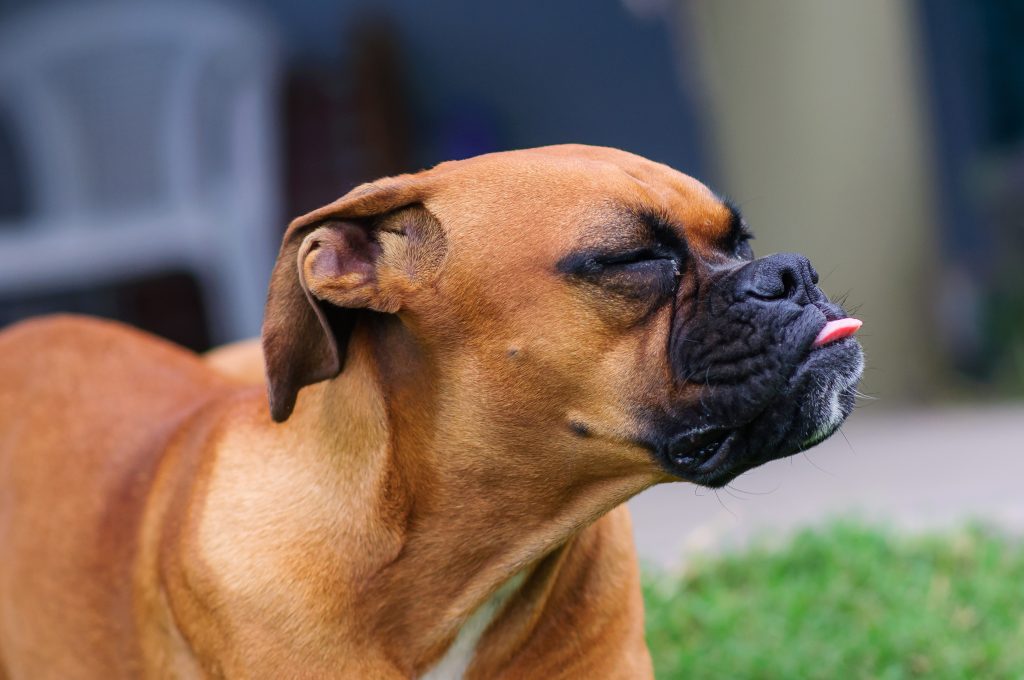Many dog owners recognize the sound of a Pit Bull snort. This noise often indicates excitement, agitation, or even dominance. While occasional snorting can be a normal response, frequent or unexplained snorting may signal an underlying issue. If your Pit Bull snorts more than usual, it’s important to understand the causes and explore effective solutions to help reduce or stop this behavior. In this article, we’ll delve into the reasons why Pit Bulls snort and offer tips on how to manage and alleviate the problem.
What Causes a Dog to Snort?
Snorting can happen for various reasons, and understanding these causes is crucial to determine the best solution for your dog. Here are the main factors that can lead to a pit bull snorting:
1. Anxiety and Stress
Anxiety and stress are among the most common causes of snorting in dogs. When dogs experience anxiety (due to unfamiliar environments, loud noises, or separation from their owners), they may start to breathe heavily or snort. This is the dog’s way of reacting to stress or tension. For instance, when your pit bull is excited or anxious, it may take deep breaths and release air forcefully through the nose, which can create a snorting sound.
Solution: Obedience training can be a helpful tool in managing your dog’s anxiety. By teaching your dog to stay calm during stressful situations, you can prevent the snorting caused by anxiety. Additionally, providing a calm and predictable routine will help your dog feel more secure and less stressed.
2. Allergies
Just like humans, dogs can suffer from allergies, and they often show symptoms such as sneezing, snorting, or even itching. Common allergens for dogs include pollen, dust mites, mold, and certain foods. If your pit bull is snorting due to an allergic reaction, you may notice other symptoms like watery eyes, skin irritation, or coughing.
Solution: To manage allergy-related snorting, keep your dog’s environment as allergen-free as possible. This could involve regularly cleaning the home, using air purifiers, and making sure your dog’s bedding is washed frequently. If allergies are severe, your veterinarian may recommend medication or a change in diet.
3. Infections and Respiratory Issues
Respiratory infections or illnesses can also cause snorting. Conditions such as kennel cough, bronchitis, or sinus infections can cause nasal congestion, resulting in snorting or wheezing. These infections can cause your pit bull to snort excessively, particularly when it has difficulty breathing through the nose.
Solution: If your dog’s snorting is accompanied by other symptoms such as coughing, nasal discharge, or lethargy, a visit to the veterinarian is essential. The vet may recommend antibiotics or other treatments to address the underlying infection. Early diagnosis and treatment are important to avoid more serious respiratory problems.
4. Autoimmune Disorders
Autoimmune disorders can cause inflammation in various parts of the body, including the respiratory system. Diseases like lupus or autoimmune thyroiditis can lead to symptoms such as snorting, nasal discharge, and difficulty breathing.
Solution: If you suspect your dog’s snorting is due to an autoimmune disorder, it’s crucial to consult with your vet. Specialized testing and blood work can help determine the presence of an autoimmune condition, and your vet will work with you to develop a treatment plan.
5. Injuries or Tumors
Physical injuries or growths like tumors can obstruct a dog’s nasal passages, leading to snorting. For example, if your Pit bull snort has recently experienced trauma to the face or has developed a growth in its nasal cavity, this could cause the snorting sound. Tumors or polyps can block airflow, causing your dog to snort or make other abnormal sounds when breathing.
Solution: If your dog has had a recent injury or seems to be snorting excessively, seek immediate veterinary attention. A veterinarian may recommend imaging tests, such as an X-ray or CT scan, to identify any injuries or tumors. Surgical removal or other treatments may be necessary, depending on the severity of the condition.
6. Medications and Side Effects
Certain medications can cause side effects, including snorting. For instance, medications such as corticosteroids, antihistamines, or sedatives might affect your dog’s respiratory system, leading to snorting or labored breathing. Some dogs may also develop snorting as a result of nasal congestion caused by these drugs.
Solution: If your pit bull is on medication and you notice snorting as a side effect, consult with your veterinarian. They may adjust the dosage or switch to a different medication that doesn’t cause these symptoms. Always follow the prescribed treatment plan and discuss any side effects with your vet.
What Can Be Done to Stop My Pit Bull from Snorting?
Now that we’ve discussed the causes, let’s focus on solutions. Several approaches can help reduce or eliminate snorting in your pit bull, depending on the underlying cause. Here are a few methods you can try:
1. Obedience Training
Training your dog can significantly reduce anxiety-related snorting. Reward your dog for calm behavior, especially when it’s in stressful situations. For example, when your Pit bull snort begins to snort out of excitement or stress, redirect its attention and reward it when it remains calm. This will help it associate calmness with positive reinforcement.
2. Environmental Adjustments
If your pit bull is snorting due to allergens or environmental factors, adjust the environment to make it more comfortable. Air purifiers can help remove allergens from the air, and regular cleaning can reduce dust and pollen. You might also want to invest in hypoallergenic bedding and ensure your dog’s living space is free from irritants.
3. Medication for Health Conditions
If your dog’s snorting is related to a medical condition, such as an infection or autoimmune disorder, medication may be necessary. Antibiotics for infections, anti-inflammatory drugs, or medications for allergies can help reduce the symptoms that lead to snorting. Always follow your vet’s recommendations and give the medications as prescribed.
4. Muzzles or Anti-Snoring Devices
In some cases, especially if the snorting is caused by excessive air intake or nervous behavior, using a muzzle or anti-snoring device may help. These tools help regulate airflow and prevent excessive snorting. Consult with your veterinarian before using these devices to ensure they’re safe for your dog.
5. Herbal Remedies and Supplements
Some owners turn to natural remedies to help calm their dog’s nervous behavior. Herbal supplements such as valerian root or chamomile may help reduce anxiety and promote relaxation. However, it’s important to check with your veterinarian before introducing any new supplements to ensure they’re safe for your pit bull.
6. Consulting a Veterinarian
If your dog’s snorting persists or worsens despite trying these solutions, it’s time to see a vet. A vet can perform a thorough examination to diagnose the underlying cause of the snorting. They may recommend specialized tests, including blood work, X-rays, or an endoscopy, to determine the best course of action.
Conclusion
Pit bull snorting can stem from a variety of causes, including anxiety, allergies, infections, and more. By understanding the reasons behind your dog’s snorting, you can implement the right solutions to help reduce or stop it. Whether it’s through training, environmental changes, or medical treatment, there are several ways to improve your pit bull’s comfort and health.
Don’t ignore excessive snorting—it could be a sign of an underlying condition that requires attention. If your pit bull’s snorting persists or is accompanied by other symptoms, consult with your veterinarian. With proper care and attention, you can help your dog stay happy, healthy, and free from unnecessary discomfort.
Thank you for reading, and we hope this guide helps you find the solution to your pit bull’s snorting!

